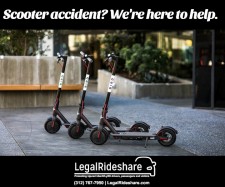
CHICAGO, June 24, 2019 (Newswire.com) - A week ago, electric scooters touched down in Chicago. In less than 48 hours, news outlets and social media were flooded with pictures of piled scooters, scooters thrown in puddles and countless videos of the riders nearly causing accidents. While scooters offer a fun and unique way of alternate mobility, there are still a lot of unanswered questions.
LegalRideshare is a close observer of the rideshare community and has been following scooter-related accidents around the country for the last year.
“We’ve been getting lots of calls and messages about people flying around streets,” Bryant Greening of legalRideshare said in an interview with CBS 2. “Cars not knowing how to handle people on the road and pedestrians getting showed out of the way by riders.” Ultimately, LegalRideshare breaks down the most pressing concerns:
#1) When accidents happen, riders pay.
For example, riders must “assume all responsibilities and risks for any injuries or medical conditions” resulting from crashes on the scooters. Further, riders are “solely responsible and liable for all consequences, claims, demands, causes of action, losses, liabilities, damages, injuries, costs and expenses, penalties, attorneys’ fees, judgments, suits, fees (including impounding fees charged by any local government), and/or disbursements of any kind” as a result of using the services.
Consider that, even if Lime is sued (and they will be), the rider must reimburse Lime for any money it pays to an aggrieved party, including the company’s attorneys’ fees and litigation costs.
#2) Accidents involving scooters and Uber can take on a hefty price.
If a scooter causes an accident with an Uber and the Uber driver gets hurt, they could (1) sue the scooter rider directly, (2) sue the scooter rider and scooter company or (3) pursue an uninsured motorists claim with Uber's insurance carrier.
#3) Unenforceable
Greening has expressed concerns that regulations for electric scooters have often gone unenforced, or completely ignored. For example, riding while intoxicated, riding without a helmet or riding in pedestrian walkways and sidewalks.
"Other cities have been trying to set up spots where the scooters can be left, setting up zones where scooters can be dropped off at night, but a lot of the time that’s unenforceable," Greening said in the interview with CBS 2.
While electric scooters are here to stay, LegalRideshare expresses serious concerns that the regulations and policies need to change.
Source: LegalRideshare
Share:
